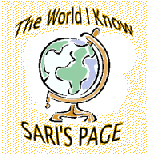|
June 4, 2001
ďI still havenít found what Iím looking forĒ - U2
Lately, Iíve been giving some though to what exactly it means to me to be Jewish. I consider my Jewish identity very strong, but what it all means isnít particularly straightforward. Why is it such an important part of my identity? It was always something I just accepted without questioning, but in truth, "because it is" is no answer at all.
Religion is just one of many answers to the questions that most human beings spend their lives searching for. Maybe thatís why so many strongly religious people are so at peace with themselves and with the world. Everyoneís looking for meaning in life, from all kinds of different sources. Itís human nature to want connection, a sense of belonging to something greater than ourselves, and a sense of community. We want connection to our pasts and our heritage. We want answers to the big questions: where do we come from? Whatís the meaning of life? Why do good people suffer? Why is evil often rewarded?
Religion provides solutions to many of these questions, to those who believe, but it also provides many new questions. Some people can settle those nagging doubts with blind belief, but those who question religion and point out its many contradictions usually become disillusioned.
Furthermore, religion is divisive. Now, itself, religion does not cause conflict and war, people do. So technically, blaming religion is unfair. People may use religion as an excuse for divisions, but divisions would happen anyway - by age, sex, skin colour, taste in clothing, home town, speech style or language, field of employment . . . the segmentation possibilities are endless, something I as a marketing student am well aware of. And itís human nature to look for these divisions. For instance, in my all-Jewish high school, religion couldnít be a dividing criteria, of course, so we created artificial divisions - Ashkenazi versus Sephardic, Dollard versus St-Laurent, and the like.
No matter how homogeneous a society is, divisions will get created. And in itself, thatís perfectly okay. The key lies in not equating "different" with better or worse. Different can - and should - be equal. Maybe one way we will get to that Utopian ideal, but of course, thatís highly unlikely. Sociologists use in-group / outgroup theory to explain our tendency to equate people the same as us as better than those who differ from us. Religion is just one more way that people do that.
That brings back the question of what exactly it means to me to be Jewish. To some, itís a belief system, but Iím unsure as to whether I even believe in G-d. I certainly donít believe in the bible as a literal account of events. Iím more traditional than some people and yet I follow very few of the customs and even less of the laws. And Iíd be hard-pressed to explain why I follow some and not others. But if Judaism is simply a belief system or a set of laws to follow, then people wouldnít be born into it, theyíd have to come to it on their own. However, Iím Jewish because my parents were and my grandparents and my great-grandparents.
To me, Judaism is more of a culture than a religion. Especially here in Montreal, itís a community, but itís also a heritage and a connection to the past. Of course, if thatís true, then how can someone convert to Judaism? They canít create a new past, can they? And yet, people do convert. So it canít simply be a history and a heritage.
So what else is it, then? Perhaps it is a separate entity that exists both because of the people who make it up, and influences them, much like the definition of a society. As much as I hate hearing "society made me do it" as an excuse, I donít dispute that society has influences that are greater than the sum of its parts. Judaism as a worldwide society is the closest I can come to defining it. On one hand, if there were no Jews, it wouldnít exist. On the other hand, it is something greater than myself, something I choose to participate in whenever I go to a Passover seder or donate money to Israel. Some people are far more integrated in it than others, and it holds different meanings for everyone.
Ultimately, though, all people are looking for the answers. Whether their path is through religion, obsessive meditation, staring at crystals, running fifty kilometers a day, or talking to the walls, everyone has to come to their answers on their own terms. Aerosmith said "Lifeís a journey, not a destination". Well, maybe the destination is the answer, and once you find it, thereís no more reason to live. I kind of like the idea of life as a search for meaning. It seems so much more purposeful than simply spending each day killing time.
|
